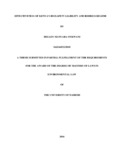| dc.contributor.author | Onkwani, Hellen M | |
| dc.date.accessioned | 2017-01-04T13:26:50Z | |
| dc.date.available | 2017-01-04T13:26:50Z | |
| dc.date.issued | 2016 | |
| dc.identifier.uri | http://hdl.handle.net/11295/98920 | |
| dc.description.abstract | Biotechnology‘s impact on human health and environment is unknown. The main product of biotechnology is genetically modified organisms (GMO).There are various benefits of GMO‘s especially for developing countries like Kenya where food scarcity is a perennial problem. The benefits of biotechnology and GMO‘s therefore, have to be weighed against the risks likely to occur. This calls for striking a balance in order to ensure that biotechnology does not result in harm to the consumers of the various products. It‘s upon this premise that an established liability and redress mechanism comes in handy to ensure that biotechnology does not result in harm to the consumers. Kenya is a party to the Convention on Biological Diversity and the Cartagena Protocol. In the year 2011, Kenya opened up to Genetically Modified crops after approving laws to allow production and importation. Kenya‘s commitment to liability and redress was put into question in November 2012, when the president banned the importation of GM foods and the Ministry of Public Health ordered public health officials to remove GM foods from the market and enforce the ban. This put Kenya‘s legal and regulatory framework in doubt. The work of National Biosafety Authority was also put into jeopardy by this lack of political good will. The big gap between what the law provides on biosafety and the practical reality led to this research. The research has adopted a secondary approach in addressing the legal aspects of assessing the effectiveness of Kenya‘s liability and redress regime. The research found that there is first, the need for political good will to ensure that institutions tasked with the formulation and review of laws and policies play their roles well. The mandates of various institutions to be clearly defined in law, so as to have a coordinated approach in biosafety regulation in the country and reduce duplication of functions among institutions. The current biotechnology framework is not specific in addressing liability and redress and it needs to be relooked into and be cast in a manner specifically to address liability and redress in biosafety. Public participation was also found to be key in all the processes. | en_US |
| dc.language.iso | en | en_US |
| dc.publisher | University of Nairobi | en_US |
| dc.rights | Attribution-NonCommercial-NoDerivs 3.0 United States | * |
| dc.rights.uri | http://creativecommons.org/licenses/by-nc-nd/3.0/us/ | * |
| dc.title | Effectiveness of Kenyans biosafety liability and redress regime | en_US |
| dc.type | Thesis | en_US |



